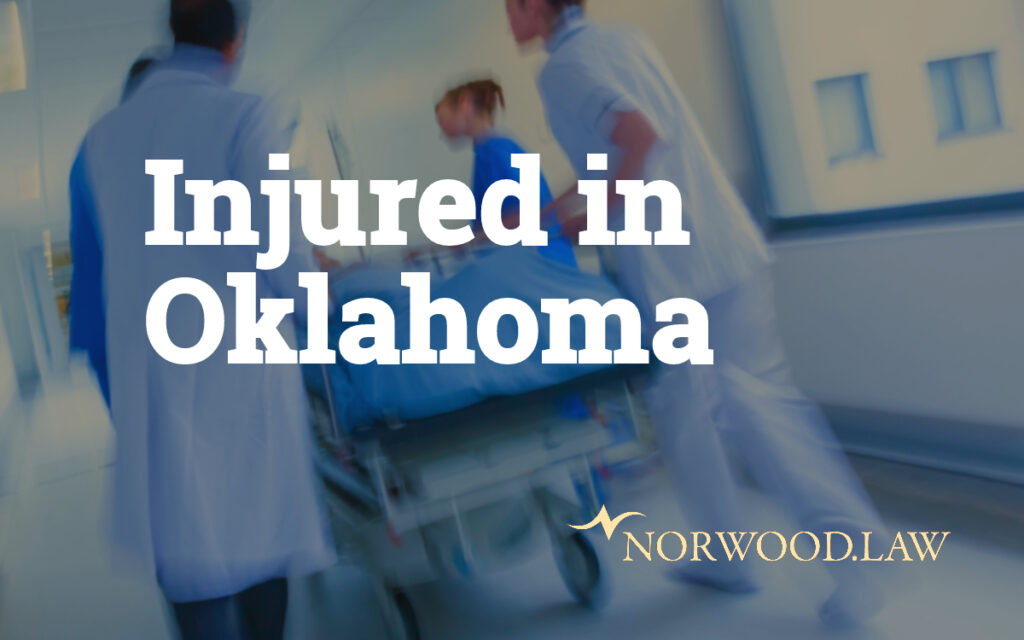By G.W. Schulz
If you’ve suffered a personal injury, you don’t need or want a lecture from a lawyer about what laws exist. You need an advocate who can show you precisely what those laws can do to help people who have been victimized.
At Norwood.Law, we speak the language of compassion. Tragedy can strike anyone at any time, and we’re by your side if it happens. We won’t try to impress you with fancy words. We’ll give the truth to you directly and be your voice in the courtroom.
Here are some important statistics you should know about injuries in America. Over 15 million adults in the United States last year suffered “an activity-limiting injury,” as it was called by the U.S. Centers for Disease Control and Prevention in 2021. Some 40 million visits to the emergency room for injuries took place that same year. Millions more than that number in 2018 visited physicians for injuries. If you’ve been injured or know someone who has and it was someone else’s fault, keep reading below to learn more.
In the meantime, is the government accusing you or someone you know of a crime? Are you caught up in a legal dispute? If so, trust Norwood.Law to be your advocate and tell your side of the story. We practice personal injury, criminal defense, business, family law, and more. Need help with a will, trust, or estate? We do those, too. When you find yourself in need of our help, visit Norwood.Law online or call us for a consultation at 918-582-6464.
Below is a list assembled with assistance from the Norwood.Law blog and law experts interviewed by legal scholar Maria Cudowska of important things you’ll want to know about injury claims and what to expect from attorneys like us:
- We’ll treat you with kindness and empathy from the first interaction We know that one of the first important decisions you make following a serious injury is who will represent you. That’s in addition to emotional drainage or damage you might be experiencing from the injury itself. Emotional intelligence is a crucial quality for a high-performing attorney to possess. Understanding our own emotions toward a case can be as important as understanding yours. Then we can focus on achieving the best outcomes for you. Equally important are your physical and medical conditions. You should seek medical treatment right away after experiencing an injury, or fall, or vehicle accident, or attack, or other similar incident. Seeing a doctor quickly after the injury will help determine if indeed the injury is related to the incident or accident. It also simply helps to make sure that you receive the medical treatment you need.
- We know how the law applies to your suffering “Tort law” is the opposite of criminal law and involves the legal remedies that are available to you when a person causes you to experience loss or harm. We know the emotional toll on you of testifying in court could be worse than alternatives like a less-stressful meeting with mediators in a non-adversarial environment. Norwood.Law helps you, the client, feel heard. Said one lawyer to scholar Cudowska: “I’ve had clients say, ‘You’ve really made me feel better.’ When I talk about their emotions, their feelings, I make sure that they feel heard, because I think that’s important.”
- We’ll be honest with you throughout the process Some injuries are simply not “compensable,” which means they don’t allow for compensation under the law. As Cudowska says, personal injury cases are complicated by the views of loved ones of the victim on what fair compensation and justice should look like. This is particularly the case in emotionally charged wrongful deaths where loved ones have difficulty seeing the person they lost as a mere dollar figure. “Being mad and angry is not a compensable injury unless it has a psychodynamic piece to it,” Cudowska writes.
- Work to establish goals in any dispute or suit There are any number of reasons why you might decide to pursue litigation. We’re with you all the way, either way. During an accident, specific injuries might occur, some of which can lead to monetary and non-monetary forms of compensation. How and what compensation you might receive can hinge on physical injuries that resulted in you experiencing economic losses and pain and suffering. For example, here are five types of losses in wrongful-death cases:
- Direct costs linked to the death
- Loss to society of deceased and loss to loved ones
- Affect on kids of losing a parent
- Emotional toll sustained by survivors
- Loss of the life itself
- Communicate effectively with you throughout the case We’ll properly frame statements and questions to make our explanations of the case as clear as possible to you. We’ll interview you at length to learn the facts of the case and then stay connected. We know which questions to ask and how to ask them. Said another lawyer to Cudowska: “A compassionate lawyer asks the right questions and stays in touch with the client.” She quotes another: “Plaintiffs can be very emotional before seeking legal counseling. As a result, lawyers may need to address the emotions of the client first and later proceed to a thorough analysis of the law.”
